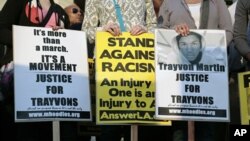A special prosecutor in the southern U.S. state of Florida said a grand jury will not look into the fatal shooting of an unarmed black teenager by a white, Hispanic neighborhood watch volunteer in February. Under Florida law, the decision eliminates the possibility of a first-degree murder charge in the case - and leaves the decision to bring any charges to prosecutor Angela Corey alone.
So far, the shooter has not been arrested or charged with a crime because of Florida's "Stand Your Ground" law - which says a person has a right to stand his or her ground and meet force with force. The case has renewed a national conversation about gun laws.
Neighborhood Watch volunteer George Zimmerman said he shot 17-year-old Trayvon Martin in self-defense during a confrontation, after calling the police emergency line to report a suspicious person:
Dispatcher: "Are you following him ?
Zimmerman: "Yes."
Dispatcher:"Ok, we don't need you to do that."
The case has cast a spotlight on Florida's "Stand Your Ground" law, which gives people the right to protect themselves with deadly force, even outside of their homes.
Zimmerman told police he shot Martin after the teenager punched him and slammed his head on the sidewalk. Authorities did not charge Zimmerman with a crime because of the law.
But former Florida Governor Jeb Bush, who signed the statute in 2005, doesn't think it applies in the Trayvon Martin case.
"'Stand Your Ground' means 'Stand Your Ground.' It doesn't mean chase after somebody who's turned their back," Bush said.
Supporters of the "Stand Your Ground" law said it has reduced violent crime and protects citizens who are trying to defend themselves. Greg Stone favored expanding gun rights laws.
"Its been proven over and over again that it will make it more safe. An armed society is a polite society," said Stone.
Daniel Gross with the Brady Center to Prevent Gun Violence disagreed, and told members of Congress the law needs close examination.
"In Florida law enforcement authorities do not have the discretion to take away licenses to carry concealed weapons even from those who have killed unarmed people, which occurs with alarming regularity in states like Florida with Stand Your Ground or, more aptly named 'Shoot first, ask questions later', laws," said Gross.
Florida law enforcement data indicate the number of justifiable homicide cases tripled in the first five years the "Stand Your Ground" law was on the books. Florida criminal defense attorney Kendell Coffey via Skype.
"The way it [the Stand Your Ground law] is being applied and the way juries are reacting, it's tantamount to a license to kill anytime the shooter makes a claim of self-defense and there are no eyewitnesses to contradict the shooter's claim," said Coffey.
Former Florida state senator Durell Peaden, who helped craft the law, said it was not meant to allow abuse. "This law says nothing about vigilante type law. It says nothing about following anybody, it says nothing about those premeditated points by carrying a gun when you are following anyone," he said. "Those issues were not addressed and not intended to be addressed in this law."
More than half of all U.S. states have similar laws.
The controversy surrounding them continues to grow. Many of the demonstrators who have taken to the streets since the Trayvon Martin shooting hope lawmakers will take a closer look and take steps to revise them.




